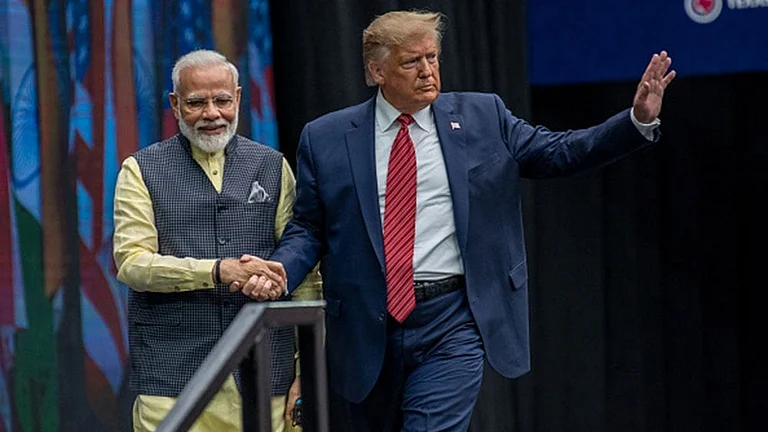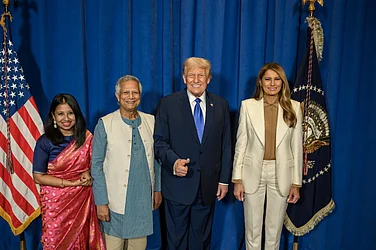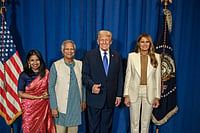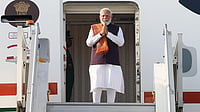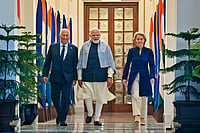The provisional announcement by the International Court of Justice (ICJ) at The Hague on South Africa’s charge of genocide against Israel is being seen by many as an indictment of its actions in the Gaza Strip. Others see it as a step in the right direction while another group believes that the interim ruling has fallen short as it has not called for a ceasefire to halt the agony of the people of Gaza. At best, it is a moral blow to Israel’s reputation.
“Some allegations against Israel fall within provisions of the Genocide Convention. Sufficient evidence of dispute exists for a genocide case,” said Judge Joan E Donoghue, President of the ICJ, as he read out the verdict.
The verdict also said the court is “acutely aware of the extent of the human tragedy”.
South Africa is delighted with the ICJ’s verdict, knowing it has succeeded in basically “naming and shaming” Israel and focusing international attention on crimes against humanity. Israel is now in the dock. South Africa’s government called it a “decisive victory” for international rule of law. Thanking the ICJ, the government said it welcomed the provisional measures. It said the ruling marked a significant milestone in the search for justice for the Palestinians. It added that South Africa will continue to act within global institutions to protect the rights of the Palestinians in Gaza.
According to a senior official familiar with the workings of the ICJ, it would not have been possible for the ICJ to call for a ceasefire as Israel has a right to self-defence against Hamas attacks. Instead, it has called on Israel to stop killing, stop the physical destruction of Palestinians, stop imposing measures to prevent births, and stop causing bodily harm to Palestinians.
“How does Israel do all this without toning down its approach? The judgement has also attracted attention to Israeli acts and exposed those like the US, UK, Canada, and Germany, who were saying that case has no merit,” says the official who did not wish to be named.
Despite the disappointment that the ICJ did not call for a ceasefire as requested by South Africa, many Palestinians are delighted. “The Israeli occupation was issued a yellow card. We are yet to see the red card being served. It is a step in the right direction although many had hoped for a full call for a ceasefire. Yet none of the rulings can be implemented without a ceasefire taking place. The acceptance of the case is an acceptance of the principle upon which the case was submitted which is genocide,” says Sabri Saidam, Member of the Central Committee of the Palestinian party Fatah, to Outlook.
The ICJ has also refuted Israel’s argument that the world body has no jurisdiction to rule on the issue. Instead, it has called on Israel to refrain from acts under the Genocide Convention. It asked Israel to punish incitement to Genocide by Israeli leaders. Israel also has to submit a report in a month on compliance.
However, while the ICJ has asked Israel to take all measures to prevent genocide, it has remained vague on how that should be done. “The state of Israel shall...take all measures within its power to prevent the commission of all acts within the scope of Article II of the Genocide Convention,” said the ICJ.
The bombing of civilian targets, hospitals, ambulances, schools and housing societies are acts of genocide, but the World Court has not called for a stop to the bombings or an immediate ceasefire as South Africa had requested. However, Israel will have to take care against indiscriminate bombings of civilian targets — or will it?
Reuters reported that Palestinian Foreign Minister Riyad al-Maliki has said Palestine welcomes the provisional measures ordered by the International Court of Justice (ICJ). He said, “The ICJ judges assessed the facts and the law, they ruled in favor of humanity and international law.”
The ICJ, however, is not in any position to implement what it has ordered because it does not have the means to do so. Even if it had agreed to South Africa’s request and called for a ceasefire, there was no way it would have been implemented. Whatever the verdict of the World Court, the bottom line is that the ICJ can only issue a ruling but nothing can be done beyond that. Like most United Nations (UN) bodies, it has no tools or powers at its command to ensure that its diktat is carried out.
In all matters pertaining to peace and security, the United Nations Security Council (UNSC) is the final arbiter. The five Permanent Members of the UNSC —US, China, Russia, France, and UK— wield enormous powers here. A veto by any of them can halt the process. The UNSC is a deeply divided political entity where the Big Boys play to their national interests. Israel can rest easy knowing that the United States will look after its interests. With the US elections scheduled for November, it is unlikely that President Joe Biden would like to go against the powerful Jewish lobby in the country.
Yet even the United States, with its deep-rooted support for Israel, realises that it is earning a bad name, especially among many countries in the Global South. Behind-the-scenes efforts are on by the Biden administration to rein in. Israeli Prime Minister Benjamin Netanyahu and ensure that the military action is more targeted to avoid collateral damage. The ICJ verdict will help the US in pushing Israel to wind down. Except for the US and important Western democracies, the numbers are stacked against Israel. There is also substantial support for Palestine among the youth and with large segments of African Americans. Biden is likely to come under pressure as the war continues.











